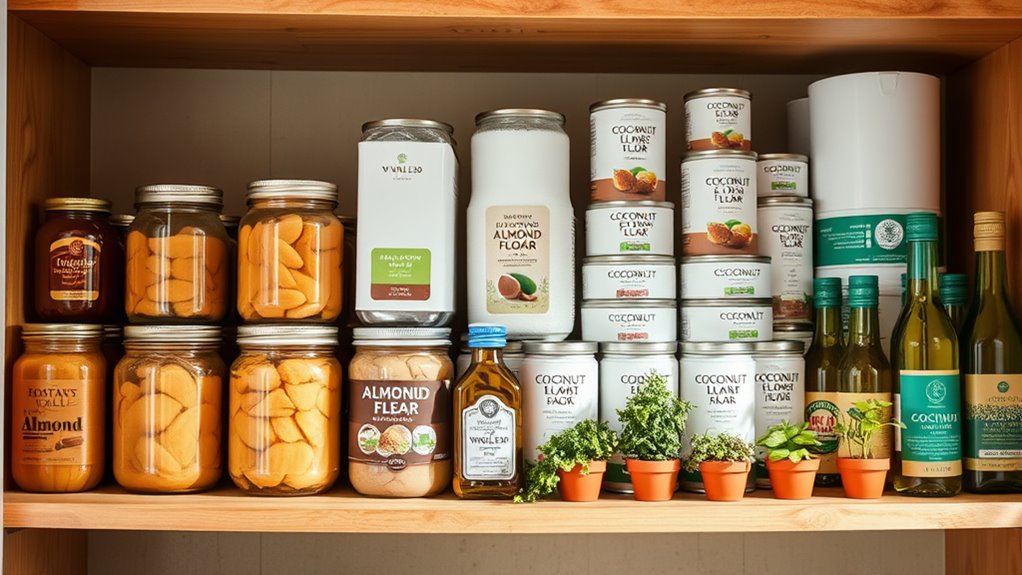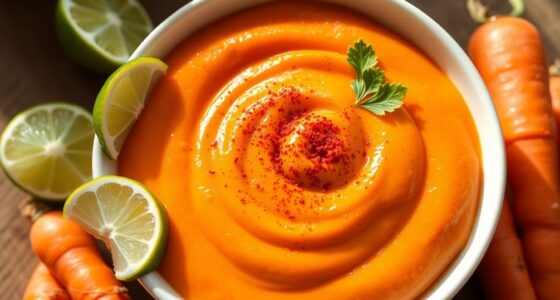To stock your Whole30 pantry, focus on nuts, seeds, and nut butters without added sugars, along with healthy oils like olive, avocado, and coconut. Keep essential condiments like vinegar, lemon/lime oils, and compliant mustards on hand. Canned proteins such as tuna, salmon, and chicken quickly boost meals, while herbs and spices add flavor without the sugar. Exploring these staples will help you create nutritious, compliant dishes—continue to uncover more helpful tips ahead.
Key Takeaways
- Stock nuts, seeds, and nut butters without added sugars or oils for snacks and meal toppings.
- Include a variety of herbs, spices, and natural condiments to enhance flavor without processed ingredients.
- Keep canned and shelf-stable proteins like tuna, salmon, and chicken for quick, nutritious meals.
- Use healthy cooking oils such as olive, avocado, and coconut oil for cooking and finishing dishes.
- Incorporate vinegar, citrus oils, and compliant mustards to add acidity and flavor variety.
Pantry Staples: Nuts, Seeds, and Nut Butters
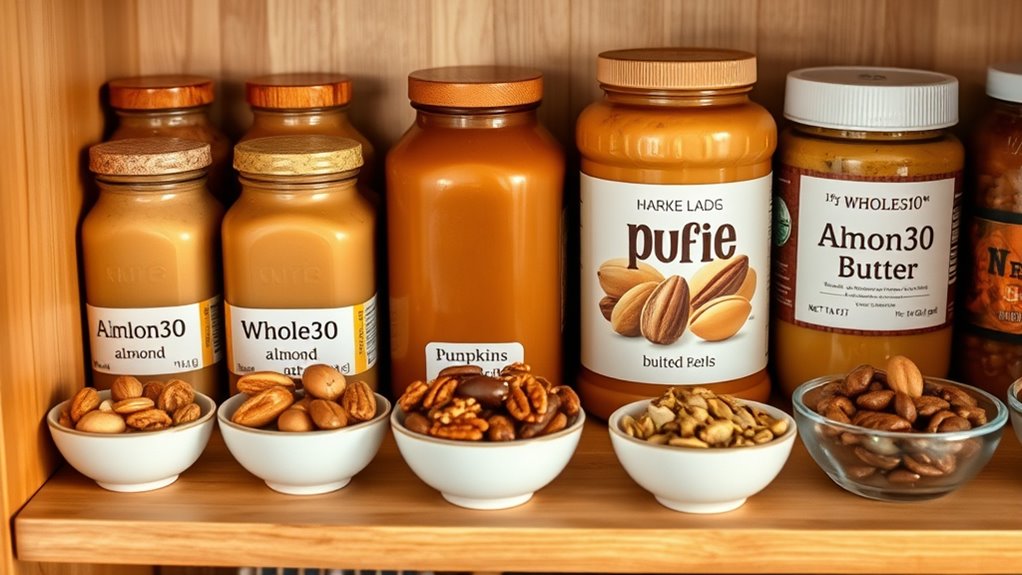
Have you ever considered how nuts, seeds, and nut butters can elevate your Whole30 pantry? These versatile ingredients provide healthy fats, protein, and crunch, making them perfect for snacks and adding texture to meals. Almonds, walnuts, and cashews are great for snacking or topping salads, while seeds like chia, flax, and sunflower seeds boost fiber and omega-3s. Nut butters, especially those without added sugars or oils, serve as rich spreads or ingredient bases for sauces and dressings. Keep a variety stocked to ensure you’re always ready for quick, nourishing options. They’re simple to incorporate into your daily routine, helping you stay satisfied and energized while sticking to Whole30 guidelines. Plus, they store well, making them an essential part of your pantry. Regularly assessing your pantry and organization can help prevent clutter and ensure these healthy essentials are easily accessible.
Essential Oils and Condiments

Essential oils and condiments are key to adding flavor and variety to your Whole30 pantry without relying on processed ingredients. Using natural options like lemon or lime essential oils can brighten dishes, while herbs like oregano or thyme boost flavor naturally. Keep a small selection of vinegars, such as apple cider or balsamic, to add acidity and depth. Coconut aminos serve as a soy sauce alternative, providing umami without added sugars. Mustards made with simple ingredients can enhance meats and dressings. Be mindful to choose condiments free from added sugars, preservatives, and artificial flavors to stay compliant. These essentials allow you to create flavorful meals and dressings that support your Whole30 goals, keeping your pantry versatile and healthy without sacrificing taste. Incorporating a variety of best anime movies can also inspire your meal prep with cultural richness and entertainment.
Canned Goods and Shelf-Stable Proteins
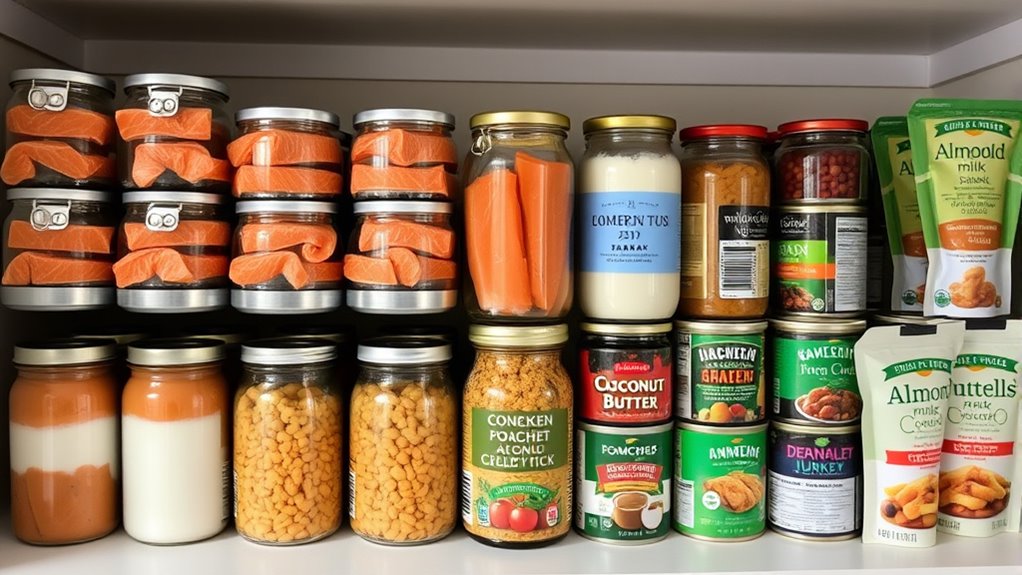
Canned goods and shelf-stable proteins form a convenient backbone for your Whole30 pantry, ensuring you always have quick, nutritious options on hand. Canned tuna, salmon, and sardines are excellent sources of omega-3s and protein, perfect for salads or quick meals. Canned chicken and turkey offer versatile protein options that require minimal prep. Keep a variety of canned vegetables like tomatoes, artichokes, and peppers to add flavor and nutrients to your dishes. Shelf-stable eggs, such as powdered or dried eggs, can be useful when fresh eggs aren’t available. These items have long shelf lives, so you can stock up without worry. Incorporating storage methods can also help satisfy cravings while staying compliant, making it easier to prepare balanced, Whole30-compatible meals even on busy days. Additionally, storing preservation methods properly can extend the usability of these pantry staples and reduce waste, aligning with design thinking principles to optimize resource management.
Herbs, Spices, and Flavor Enhancers
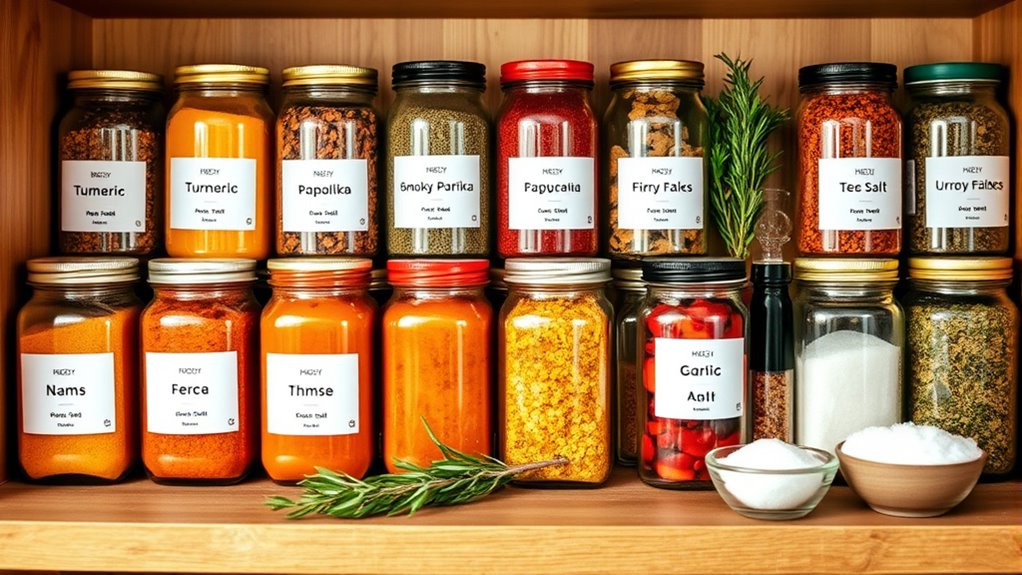
Herbs, spices, and flavor enhancers are key to making your Whole30 meals vibrant and satisfying. They transform simple ingredients into flavorful dishes without added sugars or artificial ingredients. Stock your pantry with a variety of dried herbs like oregano, thyme, and basil, which add depth to meats and vegetables. Spices such as paprika, cumin, turmeric, and chili powder bring boldness and warmth. Don’t forget flavor enhancers like garlic powder, onion powder, and crushed red pepper for quick seasoning. Fresh herbs like cilantro, parsley, and mint can be kept on hand for finishing touches. Using these ingredients allows you to customize flavors easily, making your meals more enjoyable and encouraging variety while staying compliant with Whole30 rules. Incorporating vintage kitchen tools can also inspire traditional cooking techniques to elevate your dishes.
Cooking Oils and Fats
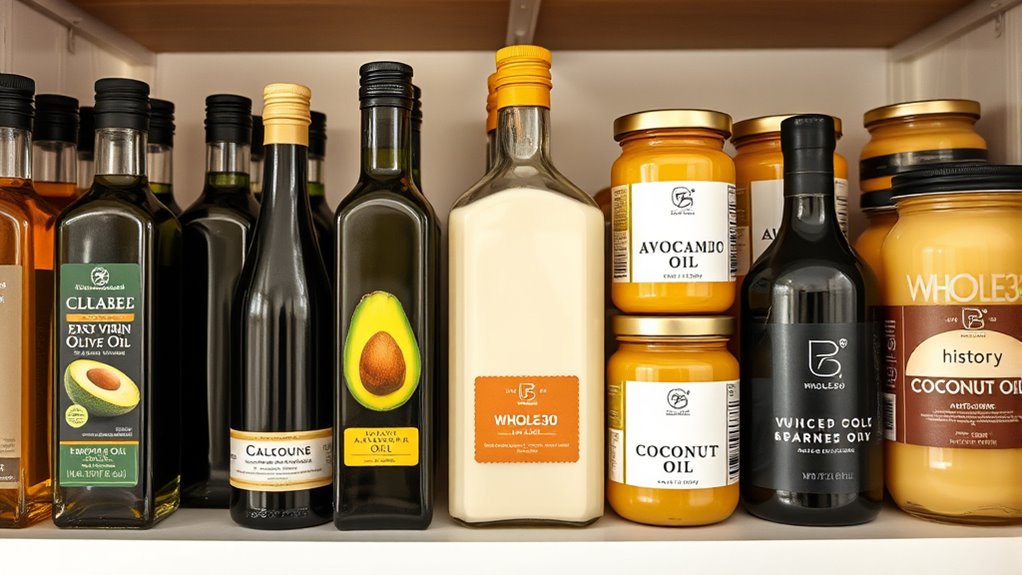
Choosing the right cooking oils and fats is essential for preparing Whole30 meals that are both flavorful and compliant. Opt for healthy fats like olive oil, avocado oil, or coconut oil, which are approved and versatile. Use olive oil for salads, sautéing, or finishing dishes to add richness without compromising compliance. Avocado oil has a high smoke point, making it ideal for high-heat cooking like frying or roasting. Coconut oil adds a subtle sweetness and works well in baked goods or stir-fries. Avoid seed oils like soybean or canola, as they’re often processed and not recommended on Whole30. Remember, moderation is key; fats are calorie-dense, so use them to enhance flavor and texture without overdoing it. Incorporating healthy fats like these can support overall wellness and help maintain energy levels during your Whole30 journey. Additionally, understanding the types of fats and their benefits can help you make better choices for both taste and health.
Frequently Asked Questions
Can I Include Dairy Products in My Whole30 Pantry?
You might wonder if dairy can go in your Whole30 pantry. Typically, Whole30 excludes most dairy, especially processed or packaged products, but some folks include clarified butter or ghee since they’re dairy derivatives without lactose or casein. Check your plan’s guidelines and listen to your body. If you’re dairy-sensitive, it’s best to skip it. Otherwise, small amounts of approved dairy might be okay, but always read labels carefully.
Are There Gluten-Free Grains Suitable for Whole30?
Are gluten-free grains allowed on Whole30? You might be surprised, but most grains are off-limits, yet a few options exist. Think cauliflower rice, spiralized zucchini, or even sweet potatoes—these aren’t grains but can mimic grain textures. While true gluten-free grains like quinoa or black rice aren’t compliant, focusing on vegetables and starchy tubers keeps your Whole30 on track. Stay curious—your meal options are more versatile than you might think!
How Do I Store Opened Oils and Nut Butters?
To store opened oils and nut butters, keep them in a cool, dark place away from direct sunlight to prevent rancidity. Make sure the lids are tightly sealed after each use to avoid oxidation and spoilage. For longer storage, especially in warmer climates, consider refrigerating them. Stir or bring to room temperature before using if they become thick or solidify, ensuring they stay fresh and maintain quality.
Which Herbs Are Most Effective for Enhancing Flavor Naturally?
Did you know herbs can boost flavor without extra calories? To enhance dishes naturally, you should try fresh herbs like basil, cilantro, and parsley—these are versatile and add brightness. Dried herbs like oregano and thyme are also effective and last longer. Using herbs is a great way to add complexity and depth to your meals without relying on salt or artificial flavors. Experiment to find your favorite combinations!
Are There Whole30-Approved Sweeteners for Baking?
You’re wondering if there are Whole30-approved sweeteners for baking. Yes, options like honey, pure maple syrup, and fruit-based sweeteners are permitted, but in moderation. These natural sweeteners can add flavor without derailing your plan. Just remember, the goal is to keep added sugars minimal. Always check labels to ensure no added non-compliant ingredients, and use these sweeteners thoughtfully to maintain your Whole30 success.
Conclusion
Stocking your pantry with Whole30 essentials keeps your meals flavorful and compliant. Did you know that a well-organized pantry can save you up to 30 minutes daily? By keeping nuts, spices, canned goods, and healthy oils on hand, you’ll always be ready to whip up nutritious, satisfying dishes. Stay prepared, and enjoy the freedom of quick, wholesome meals that support your Whole30 journey every day!
